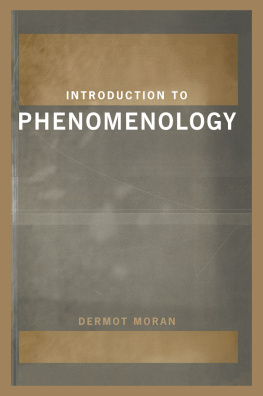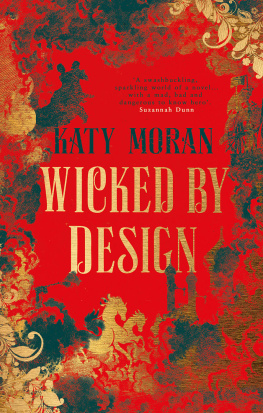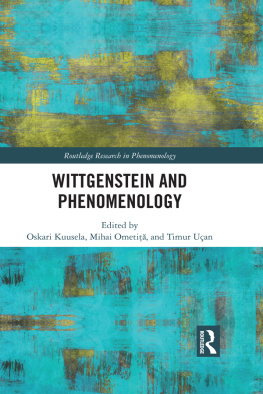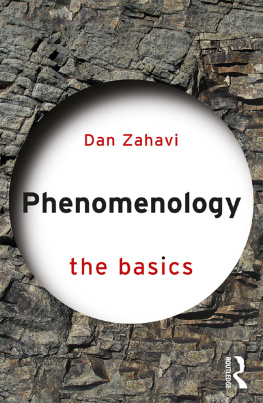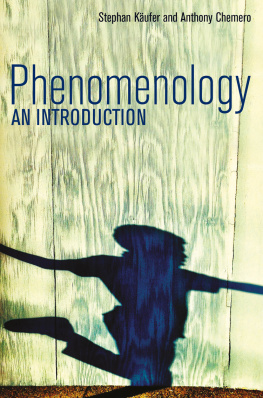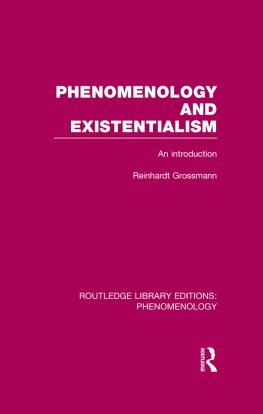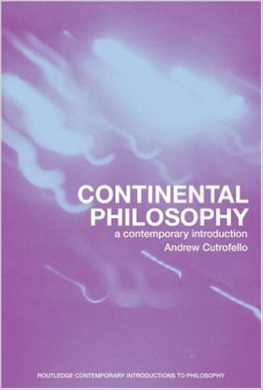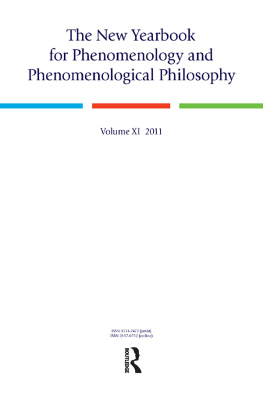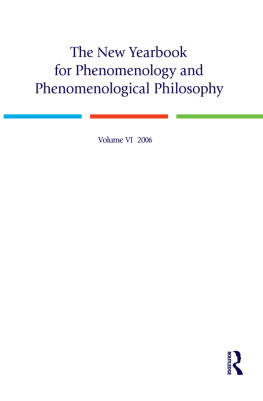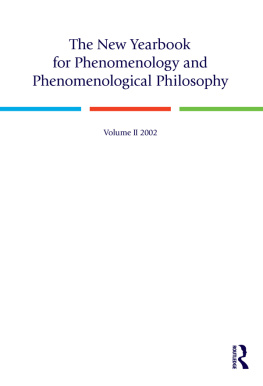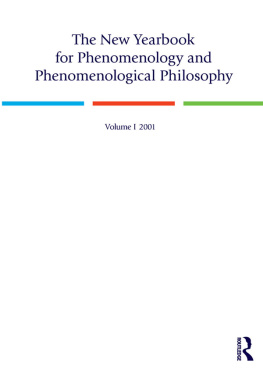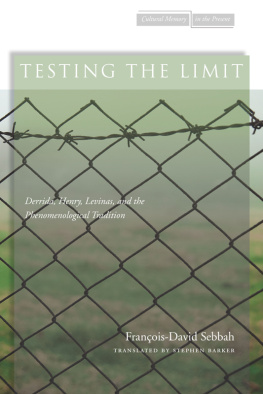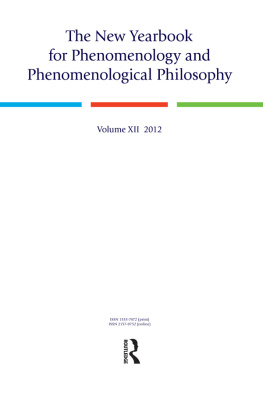
INTRODUCTION TO PHENOMENOLOGY
For years philosophers have been looking for a clear, engaging, accurate introduction to phenomenology to recommend to students and read themselves. This is the book. Introduction to Phenomenology is a pleasure to read, yet it provides deep insights into what is surely one of the most important philosophical movements of the twentieth century.
Charles Guignon, University of Vermont
This book is genuinely impressive. It provides the most accessible, the most scholarly, and philosophically the most interesting account of the phenomenological movement yet written.
David Bell, University of Sheffield
This long-awaited introduction is a work of admirable care and concision. Moran has an innovative sense of the scope of phenomenology, and the construction of the overall context within which to place each thinker is masterly. Written in a clear, succinct style, it will soon become a standard reference work in the field.
Joanna Hodge, Manchester Metropolitan University
Not since Spiegelbergs The Phenomenological Movement has one author covered so many phenomenological figures so well between two covers. Morans solid and straightforward presentations will greatly help faculty as well as students who are seriously interested in this century-old movement.
Lester Embree, Florida Atlantic University,
Editor in Chief, Encyclopedia of Phenomenology
Dermot Moran Professor of Philosophy at University College Dublin and Editor of the International Journal of Philosophical Studies.
INTRODUCTION TO PHENOMENOLOGY
Dermot Moran

First published 2000
by Routledge
2 Park Square, Milton Park, Abingdon, Oxon, OX14 4RN
Simultaneously published in the USA and Canada
by Routledge
711 Third Avenue, New York, NY 10017
Routledge is an imprint of the Taylor & Francis Group, an informa business
2000 Dermot Moran
Typeset in Times by Taylor & Francis Books Ltd
All rights reserved. No part of this book may be reprinted or reproduced or utilised in any form or by any electronic, mechanical, or other means, now known or hereafter invented, including photocopying and recording, or in any information storage or retrieval system, without permission in writing from the publishers.
British Library Cataloguing in Publication Data
A catalogue record for this book is available from the British Library
Library of Congress Cataloguing-in-Publication Data
Moran, Dermot.
Introduction to Phenomenology / Dermot Moran.
Includes bibliographical references and index.
1. Phenomenology. I. Title
B829.5.M647 1999 99-042071
142.7dc21
ISBN 0415183723 (hbk)
ISBN 0415183731 (pbk)
ISBN 9780415183727 (hbk)
ISBN 9780415183734 (pbk)
FOR MY FAMILY
AND
ESPECIALLY IN LOVING MEMORY
OF
MY NEPHEW TRISTAN MORAN
(19781999) R.I.P.
CONTENTS
This book is an introduction to phenomenology, a movement which, in many ways, typifies the course of European philosophy in the twentieth century. Writing at the close of this era, the extent of this contribution can now be more clearly articulated, appreciated, and, inevitably, criticised. Phenomenology was announced by Edmund Husserl in 19001901 as a bold, radically new way of doing philosophy, an attempt to bring philosophy back from abstract metaphysical speculation wrapped up in pseudo-problems, in order to come into contact with the matters themselves, with concrete living experience. As Husserl originally envisaged it, phenomenology had much in common with William James radical empiricism, but more than anything else it was stimulated by Franz Brentanos ground-breaking work in descriptive psychology, the a priori science of the acts and contents of consciousness. Somewhat later, Husserl came to realise the connection between his conception of phenomenology and Descartess project of providing a secure edifice for knowledge. Husserl eventually came to see that his own project had much in common with Neo-Kantianism, and thus his phenomenology became a form of transcendental idealism. But his studies of consciousness also led him to pursue investigations into our awareness of time, and history, which led to his development of the concept of the life-world, and to investigations of the evolution of culture reminiscent of Hegels phenomenology of spirit.
Husserl constantly pushed his thought in new directions, and each new phase in his thinking was developed further by the various generations of students who worked with him. Phenomenological description of things just as they are, in the manner in which they appear, the central motif of phenomenology, meant that phenomenologists were free to engage with all areas of experience. So long as one rendered faithfully the experience of the matters themselves, there was no limit put on what could be examined. Thus phenomenology blossomed into an extraordinarily diverse set of projects, a set of infinite tasks, as Husserl put it. Husserl envisaged his students as carrying out the task of mapping out the entire phenomenological domain.
However, phenomenology cannot be understood simply as a method, a project, a set of tasks; in its historical form it is primarily a set of people, not just Husserl and his personal assistants, Edith Stein, Martin Heidegger, Eugen Fink, Ludwig Landgrebe, but more broadly his students, Roman Ingarden, Hedwig Conrad-Martius, Marvin Farber, Dorion Cairns, Alfred Schtz, Aron Gurwitsch, and many others, including Max Scheler and Karl Jaspers, who developed phenomenological insights in contact and in parallel with the work of Husserl. Thus phenomenology as a historical movement is exemplified by a range of extraordinarily diverse thinkers.
Phenomenology also translated into different philosophical climates, most notably in France, where Emmanuel Levinas began a tradition of exploration of phenomenology which was developed in brilliant, idiosyncratic fashion by Jean-Paul Sartre, Simone de Beauvoir, Maurice Merleau-Ponty, Michel Henry, Paul Ricoeur, and many others. But phenomenology also provided a platform for the exploration of other possibilities, including a revolt against phenomenology. In Germany, Rudolf Carnap reacted against Heideggers view of metaphysics; Theodor Adorno, Max Horkheimer, and the Frankfurt school criticised the limitations of phenomenology from the standpoint of Marxism. Hans-Georg Gadamer developed phenomenological hermeneutics, and Hannah Arendt brought her phenomenological mode of viewing to bear on the nature of human action in the modern world. Jacques Derridas deconstruction, too, finds its origin in certain worries about the nature of signification and of presence at the centre of Husserls work, as well as drawing on Heideggers conception of the destruction of the history of philosophy.
In this book, therefore, I have tried not only to provide accessible, critical introductions to the original precursor, Brentano, and the founders, Husserl and Heidegger, but also to indicate something of the range of the later development of the movement in Sartre, Levinas, and Merleau-Ponty, on the one hand, and in Heideggers students, Hans-Georg Gadamer and Hannah Arendt, on the other. Perhaps the most unusual feature of the book is that I have decided to include both Gadamer and Arendt as important phenomenologists in their own right, but I believe that their inclusion is fully justified and rectifies an earlier neglect of their roles in the evolving story of phenomenology. The inclusion of Derrida, which may strike some phenomenological purists as odd, is justified, I believe, on the basis of his long engagement with phenomenological texts.
Next page
